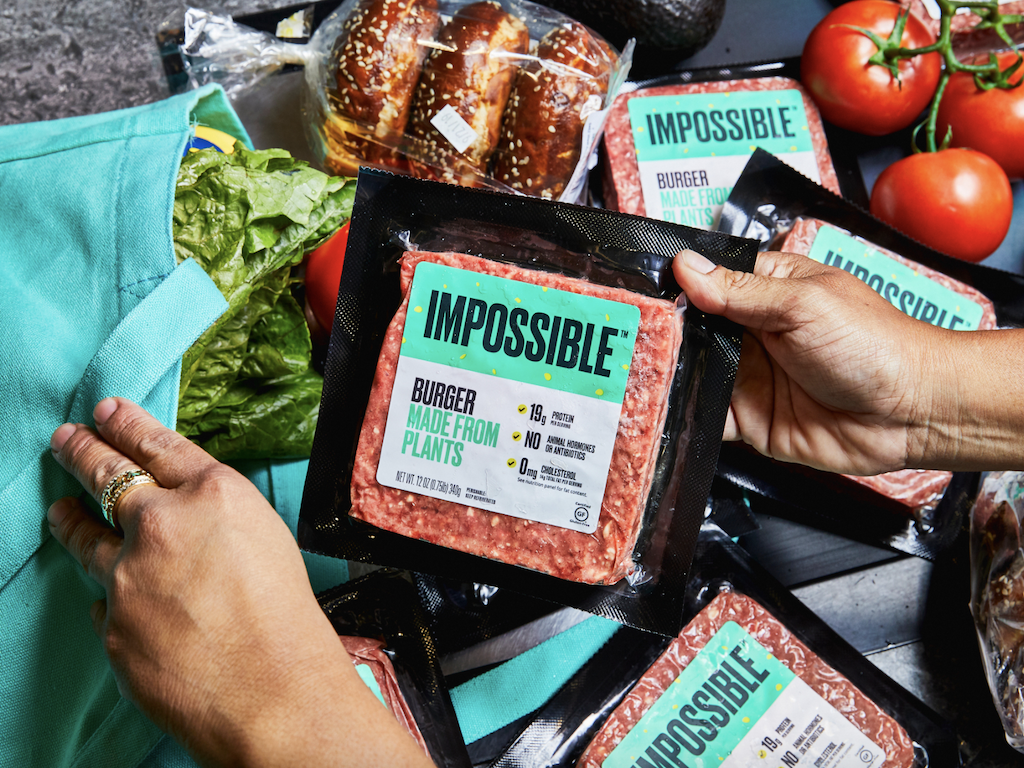3 Mins Read
On the heels of multiple milestone launches in the U.S., Impossible Foods is now rolling out its products at the country’s largest retailer Walmart. The move will expand the number of locations selling the Silicon Valley food tech’s plant-based analogues from just 150 at the beginning of this year to a whopping 8,000 across all 50 states in the country.
Impossible Foods announced on July 30 that its famous “bleeding” plant-based burger patties will be available at nearly 2,100 Walmart brick-and-mortar locations and through the retailer’s pick-up and online delivery platform. The Impossible Burger will be sold in 12-ounce packages next to the conventional meat aisle, which researchers recently found was favourable for plant-based sales and an indicator of its mainstream status.
“There’s no more important institution in retail food than Walmart,” CEO and founder Patrick Brown told Forbes. “It sells best when it’s placed in the fresh meat department. That makes perfect sense because our consumers are looking for meat.”
The news marks a huge step up for Impossible Foods’ aggressive expansion into its domestic retail market, growing its point-of-sales to over 8,000 outlets nationwide, representing a 50-fold increase from the startup’s retail footprint in just half a year.
It came just days after the food tech closed a distribution deal with Trader Joe’s, another major U.S. supermarket chain, and its earlier move to introduce its first direct-to-consumer online delivery service, which will allow users to order the brand’s range of 100% plant-based patties and beef mince to their doorstep.
However, Impossible Foods still stands behind its plant-based rival Beyond Meat, whose products can be found at over 25,000 locations in the country, and has been sold across Walmart stores since 2016.
That being said, Impossible Foods’ rate of growth is a force to be reckoned with. According to the company, at one grocery store in Southern California, its plant-based patties outsold all brands of conventional ground beef and outsold the next most popular single product by 6-times.
There’s no more important institution in retail food than Walmart. It sells best when it’s placed in the fresh meat department. That makes perfect sense because our consumers are looking for meat.
Patrick Brown, Founder & CEO of Impossible Foods
Plant-based products in general have boomed since stay-at-home orders were introduced in March this year due to the coronavirus pandemic, particularly as consumers wake up to the dangers of conventional meat, highlighted most prominently in the U.S. by major viral outbreaks in slaughterhouses across the country.
As the danger, cruelty and unsustainable nature of the meat industry continues to become exposed by the pandemic, consumers around the world are choosing plant-based substitutes more than ever before. From the U.S. to Hong Kong, surveys have indicated that shoppers are willing to opt for meat alternatives and are looking to dramatically cut down on meat consumption.
It’s a trend that the Impossible Foods’ founder and CEO believes will trigger the meat industry’s “wipe out” without the next 15 years.
Investors have clearly taken note, pouring money into the food tech even amidst the dire economic outlook and volatility. Earlier in May, Impossible Foods raised an astonishing US$500 million Series F round, which it says will be used to bring its products to price parity with conventional beef, a goal that has been undoubtedly made easier given the high-prices animal meat is fetching due to the supply chain breakdown.
Want more news on Impossible Foods? Read the latest here.
Lead image courtesy of Impossible Foods.




